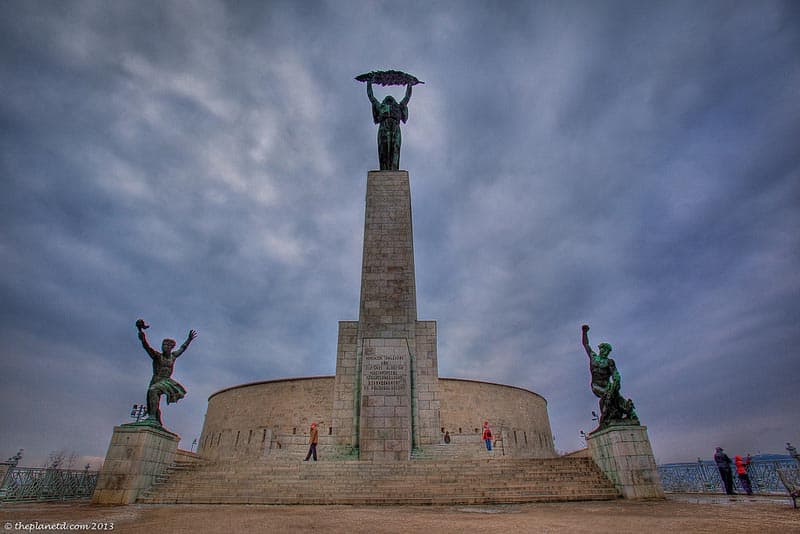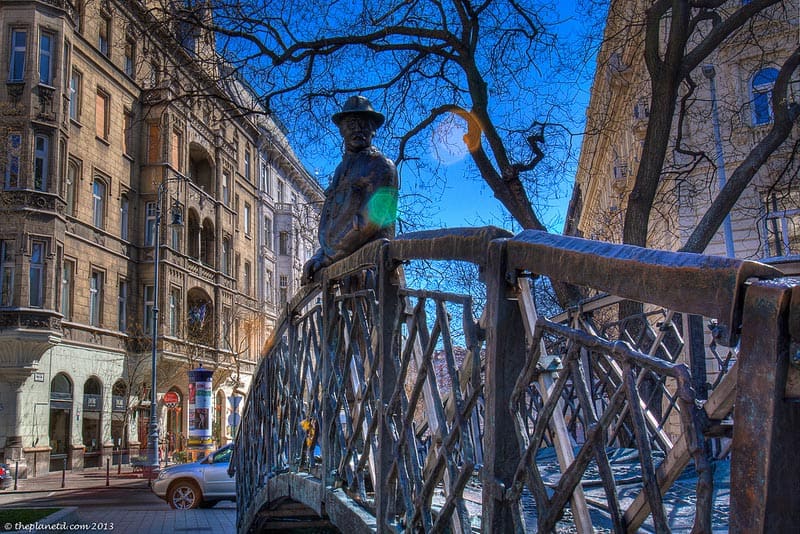After WW2 in 1949, Hungary was declared a people’s republic and was ruled by communism. The iron curtain fell in 1989; however, when you tour Budapest, you will see that there are reminders of the Communist regime scattered throughout the city today.
The most noteworthy monument is to Imre Nagy. This statue of a man standing on a bridge looking over to the Parliament Buildings longing for freedom attracts crowds each day on walking tours to learn about the city’s communist past.
He led the failed Hungarian Revolution of 1956 and was executed for Treason two years later. This monument symbolizes the difficult road to freedom.
Budapest Communist Tour
One of the few remaining Soviet Monuments is the Liberty Statue on Gellert Hill. This statue was originally erected to honor the Soviets who sacrificed themselves to free Hungary from Nazi occupation.
As we all know, that liberation came with a price, and the Soviets ended up locking out the Western world. The statue was damaged in the 1956 Hungarian Revolution, and in 1989 after the fall of communism, the statue was kept to honor all those who gave the ultimate sacrifice for Hungary. An inscription on the statue states: To the memory of those all who sacrificed their lives for the independence, freedom, and prosperity of Hungary.

You can find another communist monument downtown Budapest at Liberty Square. This Russian monument honors the soldiers of the Red Army who died during the liberation of Budapest from the Nazis. It is ironically located directly across from the US embassy, where a statue of Ronald Reagan stands on the other side. Reagan played a key role in putting an end to communism in the Soviet Union.
There are many monuments in this area from the Imre Nagy statue to the eerie abandoned MTV building. This MTV was the state-run television station pumping out daily propaganda. A luxury hotel chain from Canada has apparently bought this beautiful building but has left it standing empty since 2005.
Feel Like a Local
A lot has changed since the days of communism. Where once it would be unthinkable to even go into a person’s house, you can now rent apartments and experience firsthand how to live like a local.
We stayed in an apartment owned by a very cool gal named Roberta, who resembled Audrey Hepburn. She rents out her funky apartment to people passing through. Located in the heart of the city, close to the river, we were within walking distance of all the major attractions. It’s great to stay in an apartment because you have the chance to get to know the locals. We met Roberta at one of the ruin bars in town for a drink.
What are Ruin Bars?
Ruin Bars are a popular spot that emerged after the fall of communism. These trendy hipster pubs are decorated with retro furniture and have a very cool vibe.
Goulash Communism
Budapest is currently undergoing a significant transformation, and an interesting aspect of traveling there is the contrast between the communist era and today’s modern society. Communism is very much a part of the conversation in Budapest. People of a similar age to Dave and me recall growing up during the regime.
Furthermore, Budapest has developed more slowly than other communist cities due to a lack of funding. Consequently, this has allowed it to stave off the dreaded gentrification affecting many urban areas today. It won’t be long until the West invades, however; you will already find McDonald’s and Starbucks now. In fact, Budapest was the first city in the Eastern Bloc to open a McDonald’s.
The region had a more relaxed form of communism than other countries, earning the nickname “Goulash Communism.” They enjoyed certain freedoms and amenities not available in other Eastern Bloc nations.
Trabant Tour through Budapest
A great way to gain a better understanding of Communism in Budapest is to join a communist tour. You can take a walking tour in the downtown center or attempt a 3-hour driving Trabant tour through the streets of Budapest, as we did.
Known as “the Paper Jaguar,” the Trabant was popular during the communist era. Built in East Germany, it was affordable, compact, yet spacious enough to accommodate a family with luggage, and it was surprisingly fast. Its two-stroke engine makes this vehicle sound like a tank, but it’s delightful to drive around in, and locals will often smile and wave as you pass.





